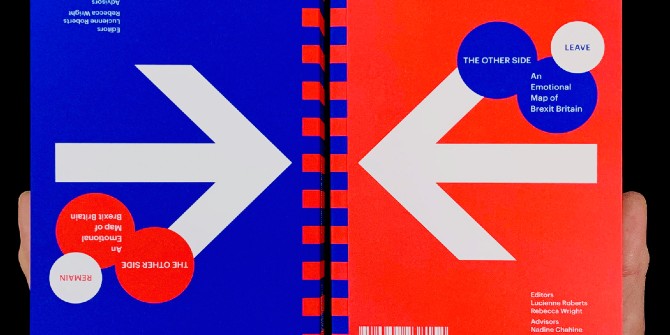 Prime Minister Theresa May’s speech in Florence was intended to move forward stalled Brexit negotiations. But as Tim Oliver (LSE/EUI) argues, Britain has found itself running into numerous problems with Brexit because its strategy for exiting the EU has been a textbook example of failed strategic thinking.
Prime Minister Theresa May’s speech in Florence was intended to move forward stalled Brexit negotiations. But as Tim Oliver (LSE/EUI) argues, Britain has found itself running into numerous problems with Brexit because its strategy for exiting the EU has been a textbook example of failed strategic thinking.
It’s said that in the First World War the Germans viewed the British troops and their generals as lions led by donkeys. One hundred years on, to much of the rest of Europe it is Britain’s national leaders, bereft of any coherent unified strategy for exiting the EU, who are donkeys misleading a great country.
If things continue as they have been, Britain’s approach to Brexit will be studied by generations of strategists as an example of flawed strategic thinking. The rest of Europe and Britain’s key allies such as the United States should lament this. As the Henry Jackson Society pointed out in a recent report, Britain remains a country of immense power and potential. It is not a dwarf and Brexit does not doom it to become one. The British people, like the troops of the First World War, will soldier on. But Brexit does pose the biggest political, administrative, and economic challenge Britain has faced in a long time. If it is handled badly, Britain will suffer unnecessary pain and losses. In facing such a challenge, the British people deserve to be led by leaders with a grasp of what it is they want to achieve and an ability to direct Britain towards it.
 CC0 Public Domain
CC0 Public Domain
Strategy is a balanced combination of ends, ways, and means, which incorporates an assessment of risk and an opponent’s likely behaviour. Successful implementation and adaptation of strategy depends on having leaders who are able and willing to react and lead the struggle. Britain’s approach to Brexit has not lived up to this definition.
Before we open this up further let us be clear that Brexit is not a simple one-off event. It is a series of overlapping multifaceted, multi-levelled processes, negotiations, and debates involving multiple actors in Britain, the remaining EU, Europe, and the rest of the world. Its wide-ranging nature and complexity make it one of the most important and difficult political issues to define and analyse. Finding a way through it, for all involved, was never going to be easy. As I’ll touch on in a future blog post, the EU’s own approach has not been without problems. But Britain has so far gone about it in a particularly poor way.
Britain has made the fundamental strategic mistake of not knowing what end it seeks from Brexit
Ends
Britain has made the fundamental strategic mistake of not knowing what end it seeks from Brexit. “Brexit means Brexit” said Theresa May. But Brexit is a process with no clearly defined destination. It’s like saying “War means war”. War, after all, is a means to an end. Britain’s leadership has been divided, unsure, and left shell-shocked by the Leave vote in a referendum in which most of them had campaigned for Remain. But in voting for Leave what the British people wanted Leave to mean – and therefore what end they want the UK government to deliver – has never been entirely settled. It is why British politics since 23 June 2016 has been defined by a battle to define the narrative of Brexit. It was the need for a mandate to define such a narrative that led Theresa May to trigger an unexpected general election. She hoped it would empower her to pursue the Brexit she outlined in January. Instead, the hung parliament that emerged has only confused things further.
That more than a year on from the vote British politicians are still arguing about the nature of a transition deal points to how far there is still to go before Britain knows what it wants from what Theresa May describes as a “deep and special partnership” with the EU. And it has not been just the governing Conservative party that has struggled. Labour, the Liberal Democrats, and other opposition parties have either fudged the issue or offered unrealistic ends as part of electoral manoeuvring rather than an assessment of what is possible or in the national interest. The inability of British politicians to know what they want and whether they can get it has led to calls for the EU to take the initiative by explaining to the UK what its options are.
Britain’s negotiators have struggled to grasp the detail because there’s so much for them to do
Ways
With an unclear end, the UK has been in no position to assess or prepare the ways to get there. Given that no plan survives first contact, the need to constantly plan and adapt is one of the key requirements of any strategy. As Former U.S. President and U.S. Army General Dwight D. Eisenhower once said, “plans are worthless, but planning is everything”. It makes sense, therefore, to task the British civil service with planning for a range of possibilities, including a no-deal scenario. That sounds an ideal way towards a resilient strategy. But the planning only started a year ago, thanks to David Cameron’s refusal to contemplate a Leave vote in the run-up to the referendum. Since then, and as noticed by the EU’s negotiators, Britain’s negotiators have struggled to grasp the detail because there’s so much for them to do. This hasn’t stopped British Ministers from promising to achieve great things. They ignored that they lacked a way – and the time –to settle Brexit in the two-year timeframe provided by Article 50. They forgot that under-promising and over-delivering is a shining virtue; vice versa, a mortal sin.
Britain’s diplomatic means in Europe are not what they once were
Means
With no clear end and inadequate and confused ways, it should come as no surprise that Britain has been unable to prepare, configure, or effectively deploy the means it has available. The means are plentiful: staff, money (not least Britain’s budgetary contributions), legal positions, diplomatic support from allies, trade deals, military and security capabilities, the status of UK and EU citizens, Britain’s trade relationships with the rest of the EU, the power of the City of London, and so forth. One reason Britain has struggled is because its diplomatic means in Europe are not what they once were. Before the referendum, a great deal of EU business was conducted via Brussels. Large parts of Britain’s diplomatic resources throughout the rest of the EU were redirected towards areas of the world outside Europe, especially emerging powers. That now must be rebalanced.
Britain also needs replacements for EU regulators, additional civil servants to undertake new work, new facilities at ports, new IT systems to address changes in how trade is handled, and much more. None of this is impossible and work has begun, but it’s still in the early phases. The rest of the EU knows this. Those who compare Brexit negotiations to a poker game overlook how both sides know exactly what the others hand is. Threatening to walk away from the EU when you won’t have the means in place to deliver a ‘hard Brexit’ in a way that doesn’t inflict real and lasting damage is a bluff the other side sees straight through.
Assessment of Risk
Britain’s assessment of the risks involved in Brexit has been lacking. In triggering Article 50 when she did, Theresa May made time an ally of the EU and increased the risk of Britain not having a settlement in time for an exit it wanted. The British government forgot what the ancient Chinese general Sun Tzu argued in the 5th century BC: ‘The victorious strategist only seeks battle after the victory has been won, whereas he who is destined to defeat first fights and afterwards looks for victory’. Having jumped headlong into Article 50 negotiations, Britain has come to realise over the past year that it needs to look for a way to victory.
the UK has spent the past year talking to itself about Brexit
Assessment of the EU
Assessment and understanding of the EU, the UK’s opponent in Brexit, has been limited. May’s speech in Florence was billed as a ‘re-engagement with Europe’. That will have perked up the ears of the rest of the EU, because, as the outgoing French ambassador in London recently noted, the UK has spent the past year talking to itself about Brexit. Leaders and decision-makers elsewhere in the EU have routinely denounced talk such as ‘having your cake and eating it’, and done so to the point of ridicule. Yet with donkey-like stubbornness, some British ministers have continued to repeat and, even worse, believe their own rhetoric. Mrs May and the rest of the UK’s leadership need to recognize that the EU is changing and that Britain’s place in Europe will be shaped by this dynamic, and not only by its own hopes and plans for Brexit. Brexit is but one of several challenges and opportunities confronting the EU, among them the pressures facing the eurozone, Schengen, Russian relations, the future of NATO and ties with the U.S. How the EU responds to these pressures will determine its place in the world and frame its future relationship with Britain.
Does this mean Britain is doomed to lurch from one Brexit crisis to the next, resulting in catastrophic humiliation for Britain? Not necessarily. Britain might have over-reached in the first phase of Brexit negotiations, but it’s still too early to evaluate the full significance of Brexit and whether the old phrase holds that you can lose a battle but win the war. That, of course, depends on where Britain and the EU end up in the 2020s in terms of their relations and relative power in the world and in Europe. The rest of the EU has its own weaknesses. Strategies for saving the euro have sometimes been nothing more than glorified exercises in muddling through, with EU decision-makers often making donkeys of themselves. The only strategy that can realistically work is one based on mutual self-interest, where losses are minimised for both sides. However, it remains unclear whether Britain, or the EU, can find ways towards this.
This article gives the views of the author, not the position of LSE Brexit or the London School of Economics. It first appeared on the Dahrendorf Forum.
Dr Tim Oliver is an Associate of LSE IDEAS. Between 2015-17 he was a Dahrendorf Fellow working on transatlantic relations. He is now a Jean Monnet Fellow at the European University Institute in Florence.







This article makes many good points. The negotiations and brexit itself are all doomed to be a failure, because there was no clarity on the ballot paper about what was meant by brexit, and of course it isn’t as simple as many brexit voters would like to believe, as they shout petulantly that “the people have spoken” and we must “just leave now”, like children shouting for a promised trip to the sweet shop. .
We are constantly being told not everyone voted for brexit for xenophobic reasons – not all brexit voters are racists! Well of course not (although most racists will have voted for brexit, so consider that). There was a massive range of reasons for voting for brexit, some of which were actually mutually exclusive. Some wanted a hard brexit, some soft. A friend voted for brexit to improve immigration rights for non-Europeans (as if that’s going to happen). A few brexit voters didn’t even really want to leave the EU, just to make a statement. So how can we keep them all happy? It’s as if we were given two choices, “paint the wall blue” or “paint the wall either green or red” . The latter may well win, but then what do you do? Of course, if the distinct options had been laid out more clearly on the ballot paper in the first place then remain would been the winner by a country mile.
The only fair conclusion is that we open our minds to abandoning brexit while we still have time. And if it takes another better thought through referendum to achieve that, then so be it.
An excellent analysis.
One striking point in all this is the apparent unpreparedness for negotiations and a clear strategy. In most commercial disputes before any party decides to terminate a contract ( a risky business for both parties generally) someone in their organisation undertakes a risk analysis and obtains legal advice. To give a notice of termination without such would be regarded in practice as negligent. Here someone decided not just to terminate a commercial contract,but a whole serious of international treaties underpinning this country’s economy for the last 40 odd years, without, it would appear, a proper risk analysis.
Tim has rightly drawn that analogy to the First World War which was followed by a peace conference in 1919 of which Harold Nicolson pointed to the very great difficulty of the Foreign Office having insufficient resource to cope with the complexity of the negotiations. It was left to junior staff such as Harold Nicolson at that time to deal with extremely sensitive matters such as the delineation of European state boundaries and the displacement of people. Surely we have learned something from the history of international relations and crises to avoid the obvious problem of unpreparedness.
It seems that yet again Britain’s bluff is called as has been suggested. But should it not be asked whether the government (author of its own misfortunes) is to be further embarrassed or humiliated as Chamberlain was at Munich in the sense that it is not prepared to negotiate from strength and sensible planning?
Britain was not ready for war in October 1938; overstretched and under resourced at Versailles in 1919 and if history, and as the article above suggest, at this rate, it will not ready for Brexit in 2019.
Brexit isn’t failed strategic thinking. There was never a strategy because there was no intention of winning. It was intended to elevate the Tories’ new Churchills to right-wing godhood as the plucky, patriotic losers. The problem was that their own selfish interests led them to outdo each other with impossible claims and lies until what was promised as a utopia. The failure is it was all make believe and that fantasy cant be delivered and the liars won’t admit they were lying.
Very good article.
I think you outline the basic issues in a practical and non partisan way. I’ll only observe that what we seem to have is the preponderance of ideology over practical reality. I tend to the view that in the end reality wins and we find that the emperor is in fact naked despite what he may have been told